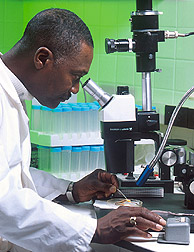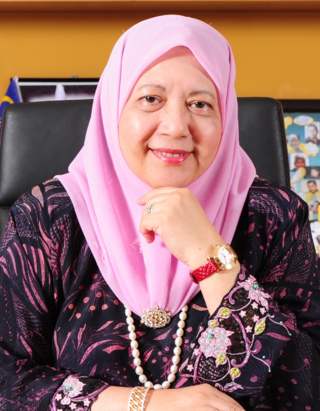Related Research Articles

Typhoid fever, also known as typhoid, is a disease caused by Salmonella serotype Typhi bacteria. Symptoms vary from mild to severe, and usually begin six to 30 days after exposure. Often there is a gradual onset of a high fever over several days. This is commonly accompanied by weakness, abdominal pain, constipation, headaches, and mild vomiting. Some people develop a skin rash with rose colored spots. In severe cases, people may experience confusion. Without treatment, symptoms may last weeks or months. Diarrhea may be severe, but is uncommon. Other people may carry the bacterium without being affected, but they are still able to spread the disease. Typhoid fever is a type of enteric fever, along with paratyphoid fever. S. enterica Typhi is believed to infect and replicate only within humans.
The International Medical University (IMU) is a private, English language, health sciences university in Kuala Lumpur, Malaysia. It was established in 1992, and is active in research and teaching within medicine and healthcare with a strong international orientation. IMU is a wholly owned subsidiary of Asia's largest private healthcare group IHH Healthcare, which is majority-owned by the Mitsui & Co. The current CEO of IMU is Abdul Aziz Baba.
The National Microbiology Laboratory (NML) is part of the Public Health Agency of Canada (PHAC), the agency of the Government of Canada that is responsible for public health, health emergency preparedness and response, and infectious and chronic disease control and prevention.

Britton "Brit" Chance was an American biochemist, biophysicist, scholar, and inventor whose work helped develop spectroscopy as a way to diagnose medical problems. He was "a world leader in transforming theoretical science into useful biomedical and clinical applications" and is considered "the founder of the biomedical photonics." He received the National Medal of Science in 1974.
The Kenya Medical Research Institute (KEMRI) is a state corporation established through the Science and Technology (Amendment) Act of 1979,, during the tenure of Nicholas Biwott as Minister of State, as the national body responsible for carrying out health research in Kenya.

Medical microbiology, the large subset of microbiology that is applied to medicine, is a branch of medical science concerned with the prevention, diagnosis and treatment of infectious diseases. In addition, this field of science studies various clinical applications of microbes for the improvement of health. There are four kinds of microorganisms that cause infectious disease: bacteria, fungi, parasites and viruses, and one type of infectious protein called prion.
Augustine Ong Soon Hock is a Malaysian scientist, academic, and board member. He is internationally recognized in the field of lipid chemistry.

Christofer "Chris" Toumazou, FRS, FREng, FMedSci, FIET, FIEEE, FCGI, FRSM, CEng is a British Cypriot electronic engineer.

Karl Friedrich Meyer was an American scientist of Swiss origin. He was one of the most prodigious scientists in many areas of infectious diseases in man and animals, the ecology of pathogens, epidemiology and public health[1-6]. Some called him the “Pasteur of the 20th century”.
Hon. Richard Tedder FRCP is an English virologist and microbiologist, was head of the Department of Virology at the University College London Medical School, and worked as virologist at Public Health England
Prof. Dr. Victor Lim Kok Eow is a Malaysian physician and microbiologist, specializing on antimicrobial resistance and infectious diseases. He is Professor of Pathology and Pro Vice-Chancellor of the International Medical University in Kuala Lumpur. He is also a member of its Board of Governors.
Umesh Chandra Chaturvedi was an Indian virologist, immunologist, medical microbiologist, CSIR Emeritus Scientist and a former chairman of the Bharat Immunologicals and Biologicals Corporation. The founder head of the department of microbiology at King George's Medical University, he is known for his studies on Dengue virus infection. Chaturvedi is an elected fellow of all the three major Indian science academies viz. Indian Academy of Sciences, National Academy of Sciences, India and the Indian National Science Academy as well as the Royal College of Pathologists and National Academy of Medical Sciences. The Council of Scientific and Industrial Research, the apex agency of the Government of India for scientific research, awarded him the Shanti Swarup Bhatnagar Prize for Science and Technology, one of the highest Indian science awards for his contributions to Medical Sciences in 1981.

Samir Kumar Saha is an eminent Bangladeshi microbiologist and public health expert. He is the professor, senior consultant and head of the department of Diagnostic Division of Microbiology at the Dhaka Shishu Hospital for children and also the executive director of The Child Health Research Foundation (CHRF) at the Bangladesh Institute of Child Health.
Sheila Dorothy King, CD was a Barbadian-born, Jamaican academic and physician. She was the second woman to be appointed as full professor at the University of the West Indies. She was the first woman appointed as a professor in the Faculty of Medicine in 1983, ten years after she was appointed as head of UWI's Microbiology Department. A specialist in infectious disease and viral epidemiology, she advised numerous national, regional and international departments and governmental agencies on such diseases as dengue, influenza, and typhoid. In 1998, she was honored as a Commander of the Order of Distinction.
Ho Wang Lee was a South Korean physician, epidemiologist, and virologist. He was the first person in the history of medicine to be the one chiefly responsible for all 3 of the following steps: (1) discovery of the virus causing a human disease, (2) development of a method of diagnosis for the disease, and (3) development of a vaccine against the disease.

Prof. Datuk Dr. Asma binti Ismail is a Malaysian academic and molecular biologist. She is the first female Vice-Chancellor (VC) of Universiti Sains Malaysia (USM) appointed in 2016. She had previously been the first female VC of Universiti Sains Islam Malaysia (USIM), and first female Director General of Higher Education.
Barrie Patrick Marmion was an English microbiologist who spent the majority of his career in Australia. He is known for his work on Q fever, and led the team that developed the first vaccine against the bacteria that causes it.

Robin Patel is a Canadian born microbiologist and was the 2019–2020 President of the American Society for Microbiology (ASM). She is the Elizabeth P. and Robert E. Allen Professor of Individualized Medicine, a Professor of Microbiology, and a Professor of Medicine at the Mayo Clinic. She is the Vice Chair of Education in the Department of Laboratory Medicine and Pathology at the Mayo Clinic, and Director of the Mayo Clinic's Infectious Diseases Research Laboratory, where she studies biofilms, antimicrobial resistance, periprosthetic joint infection and diagnostic testing of bacteria. She is the Director of the Antibacterial Resistance Leadership Group (ARLG) Laboratory Center of the National institutes of Health.
Misaki Wayengera is a Ugandan physician, academician, and a medical researcher. He serves as a lecturer for Pathology, Immunology and Molecular Biology at Makerere University College of Health Sciences. He is the chairperson of Uganda's Scientific Advisory Committee on COVID-19 for the Ministry of Health and the National Task Force.
Gueh-Djen (Edith) Hsiung was a virologist and professor emeritus of laboratory medicine. She was one of the first women to achieve the rank of professor at the Yale School of Medicine.